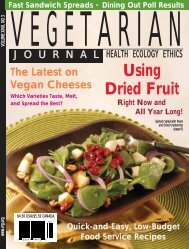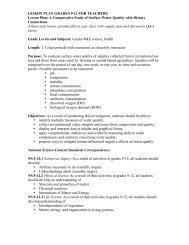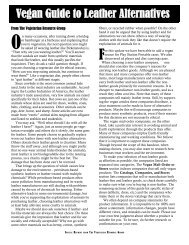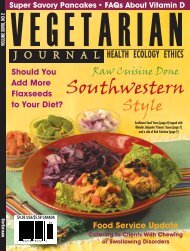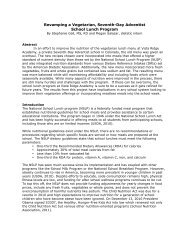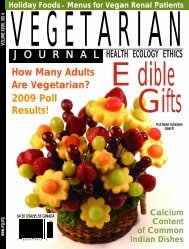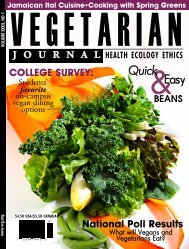Is Your Sugar Vegan? - The Vegetarian Resource Group
Is Your Sugar Vegan? - The Vegetarian Resource Group
Is Your Sugar Vegan? - The Vegetarian Resource Group
Create successful ePaper yourself
Turn your PDF publications into a flip-book with our unique Google optimized e-Paper software.
lower mortality (risk of dying from any cause) than<br />
either of the other two groups. <strong>The</strong>se results are similar<br />
to those seen in California Seventh-day Adventists and<br />
in elderly Japanese. Eating a more plant-based diet<br />
appears to lead to a longer life.<br />
Barnia C, Trichopoulos D, Ferrari P, et al. 2007.<br />
Dietary patterns and survival of older Europeans:<br />
the EPIC-Elderly Study (European Prospective<br />
Investigation into Cancer and Nutrition). Public<br />
Health Nutr 10:590-98.<br />
Harvesting Vegetables and<br />
Grains May Result in Fewer<br />
Animal Deaths Than Many<br />
Previously Thought<br />
Both academic research and media reports have popularized<br />
the idea that harvesting crops like wheat, soybeans,<br />
and corn kills large numbers of mice, voles, and<br />
other field animals. Because these crops are the basis<br />
of many vegetarians’ diets, some have used these findings<br />
to question the ethical basis of vegetarian and<br />
vegan diets. A new report examining the issue, however,<br />
concludes there is little evidence to support this view.<br />
Andy Lamey, a doctoral student at the University of<br />
Western Australia, has re-examined an earlier analysis<br />
by Steven Davis, an animal scientist at Oregon State<br />
University, which concluded that a relatively small<br />
number of animals were killed to produce grass-fed<br />
beef. Lamey raises key questions about the number<br />
of animal deaths caused by farm machinery compared<br />
to those due to animal predators and about the statistics<br />
that Davis used. In addition, Lamey points out that<br />
animal agriculture poses many more risks to humans<br />
(such as slaughterhouse accidents) than does vegetable<br />
production. Based on his analysis, Lamey concludes<br />
that vegetarians and vegans should not change their<br />
diets due to a concern about field animal deaths.<br />
Lamey A. 2007. Food fight! Davis versus Regan on the<br />
ethics of eating beef. J Soc Philosph 38:331-48.<br />
Diet and Skin Cancer<br />
Skin cancers, including melanoma, basal cell cancer,<br />
and squamous cell cancer, are the most common of all<br />
cancers. New research suggests that diet may play a role<br />
in the development of at least one kind of skin cancer,<br />
squamous cell cancer. Each year, between 200,000 and<br />
300,000 people in the United States are diagnosed with<br />
this cancer, and the incidence rate is rising. Researchers<br />
in Australia studied more than 1,000 adults over an 11-<br />
year period to see which factors were associated with<br />
skin cancer. Even when factors like sun exposure and<br />
skin color were taken into account, people who ate a<br />
lot of red or processed meat and high-fat dairy products<br />
had a greater risk of developing squamous cell cancer.<br />
This was especially true for people who had already<br />
had skin cancer. Those eating more fruits, vegetables,<br />
and whole grains and having a lower fat diet had a 54<br />
percent lower risk of developing squamous cell cancer.<br />
Of course, the most important way to reduce risk of<br />
skin cancer is to avoid excess sun exposure and to use<br />
sunscreen. Eating generous amounts of fruits, vegetables,<br />
and whole grains can also reduce your risk.<br />
Ibiebele TI, van der Pols JC, Hughes MC, et al. 2007.<br />
Dietary pattern in association with squamous<br />
cell carcinoma of the skin: a prospective study.<br />
Am J Clin Nutr 85:1401-1408.<br />
More Reasons to Eat Organic<br />
Most people would agree that organically produced<br />
foods are better for the environment because synthetic<br />
fertilizers and pesticides are not used. Several recent<br />
studies also suggest that organically grown foods have<br />
a higher level of some key nutrients than do conventionally<br />
grown foods. A study 1 of organically grown<br />
kiwis found that they had higher levels of vitamin C,<br />
potassium, calcium, magnesium, and phosphorus.<br />
Organically grown kiwis also had a darker green color<br />
and a thicker skin and tended to ripen faster than conventionally<br />
grown kiwis.<br />
Organically grown wheat was shown to be comparable<br />
to conventionally grown wheat in terms of the<br />
quality of baked products made from each kind of<br />
wheat and the nutritional value. 2 Despite not being<br />
treated with fungicides, organically grown wheat was<br />
no more likely to be contaminated with fungus than<br />
conventionally grown wheat.<br />
1 Amodio ML, Colelli G, Hasey JK, et al. 2007. A<br />
comparative study of composition and postharvest<br />
performance of organically and conventionally<br />
grown kiwifruits. J Sci Food Agric 87:1228-36.<br />
2 Mader P, Hahn D, Dubois D, et al. 2007. Wheat<br />
quality in organic and conventional farming:<br />
results of a 21 year field experiment. J Sci Food<br />
Agric (in press).<br />
VEGETARIAN JOURNAL <strong>Is</strong>sue Four 2007 29



